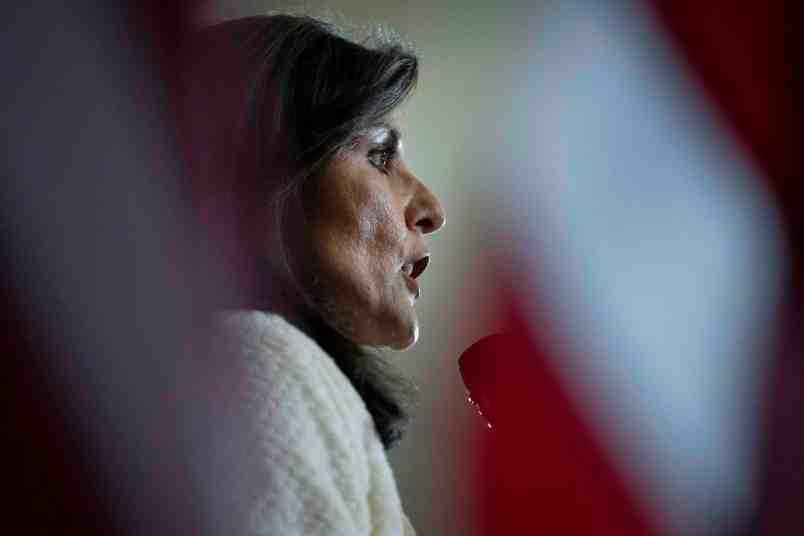Nikki Haley had appeared to pick up on the reality of abortion politics that Democrats have been harnessing to win elections since the Dobbs ruling on the campaign trail thus far. She’s maintained a semblance of rhetorical neutrality on the issue since the first Republican primary debate when she argued a national ban on abortion likely would not have the votes to overcome the Senate’s 60-vote filibuster and that Republicans must be realistic about finding “consensus” on the procedure if they hoped to run a winning campaign.
And that’s the line she’s been toeing — being “unapologetically pro-life” while maintaining she does not “judge anyone for being pro-choice” — throughout much of her time campaigning against Donald Trump, issuing open-ended remarks that are lacking in specifics in interviews and press appearances, regardless of the state she’s campaigning in. It appears that both her and Trump have learned from Democrats’ successes at the ballot box since Roe‘s overturning — and also from the failings of their former rival Ron DeSantis, who embraced the extreme six-week ban he signed into law in Florida on a national stage.
“I’ve said I’m fine with a federal law. But the thing is, in order to get a federal law, you have to have a majority of the House, 60 senators and a signature of the president,” she said in an interview with CBS News’s Face the Nation. “No Republican president can ban abortions, any more than a Democrat president can ban any state law. What we can do is let’s find consensus.”
But ahead of the primary in South Carolina this weekend — where it’s been speculated that Haley may end her 2024 bid if she loses badly to Trump in her home state, though she claims she won’t — Haley has made a rather disturbing pivot into a realm of what appeared to be fetal personhood policy so extreme and new and niche that it’s not yet even being pushed by mainstream anti-abortion activists.
During an interview with NBC News on Wednesday, Haley seemed to side with the Alabama Supreme Court in a new ruling that found that frozen embryos had the same protections as children in wrongful death lawsuits. The ruling has already had a chilling effect on in vitro fertilization in the state. The University of Alabama at Birmingham health system announced Wednesday that it would pause its IVF program fearing prosecution.
“We must evaluate the potential that our patients and our physicians could be prosecuted criminally or face punitive damages for following the standard of care for IVF treatments,” UAB spokeswoman Hannah Echols told AL.com in a statement. In this specific type of fertility care, unused or non-viable embryos are often destroyed, meaning clinics that administer IVF care in Alabama risk wrongful death lawsuits.
When asked about the ruling by NBC News, Haley declared “Embryos, to me, are babies” and said: “I do see where that’s coming from when they talk about that.”
Haley then went on to talk about her own difficulties with conception — her son was conceived via artificial insemination, which does not involve creating embryos in a lab, but is a common reproductive treatment.
Throughout the rest of the interview, Haley got a bit mealy-mouthed and appeared to walk back the initial severity of her statement, arguing there’s a difference between viable and unviable embryos and suggesting that any potential legislation crafted around IVF should include input from doctors and their patients. She repeatedly called the issue “sensitive,” revealed she hadn’t read the Alabama ruling and retreated to her middle of the road cosplaying.
“I would wanna look at it and see what they’re talking about, those that are viable versus those that are not, how they’re treating that, how they’re talking about that language, those are all sensitive subjects where the details matter,” she said of the Alabama Supreme Court ruling. “And we need to look at the details and we need to see where that is. Now where you see more women who are having trouble getting pregnant and you see more women doing artificial and in vitro, those are conversations that we need to have, but it’s also conversations we need to have women and doctors involved in the conversation to say, ‘how do we want to handle this going forward?'”
It’s unclear why the 2024 candidate would pivot to such an extreme-appearing position ahead of her home state primaries, though it could be an attempt to knock a few uneasy evangelical voters away from Trump and in her direction.
The Best Of TPM Today
Russia’s Staggering Success In Duping Willing Republicans And Right Wing Media — David Kurtz
Yesterday’s Most Read Story
No. Ezra Klein is Completely Wrong. Here’s Why. — Josh Marshall
What We Are Reading
Mike Johnson invoked God in a GOP presentation on keeping the majority. It didn’t land well. — Politico
Republicans Delete Reference To FBI Informant From Impeachment Interview Request Letter — HuffPost







“unapologetically pro-life” while maintaining she does not “judge anyone for being pro-choice”
She’s so squishy
Aileen again needs to step in to prevent Trump lawyers to fuck up the delay…
And how many has she volunteered to carry to term?
Because if the answer is “None” then she can just STFU.
This pivot is proof again of Nikki’s shortterm and longterm irrelevance.
And that’s the line she’s been toeing — being “unapologetically pro-life” while maintaining she does not “judge anyone for being pro-choice” — throughout much of her time
The last time we heard these kind of mealy-mouthed non-assurances of upholding established freedoms of abortion rights were from Coney Barrett and Kavenaugh.
This didn’t work out well for the electorate.